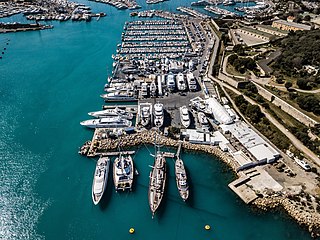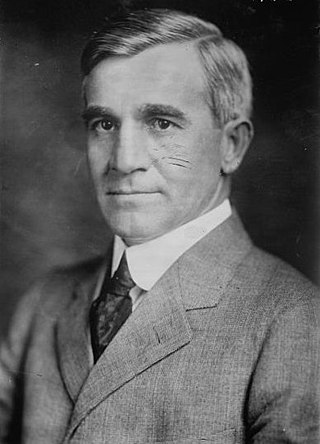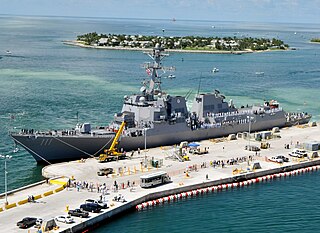
Bath is a city in Sagadahoc County, Maine, United States. Bath is included in the Brunswick micropolitan. The population was 8,766 at the 2020 census. It is the county seat of Sagadahoc County, which includes one city and 10 towns. The city is popular with tourists, many drawn by its 19th-century architecture. It is home to the Bath Iron Works and Heritage Days Festival, held annually on the Fourth of July weekend. It is commonly known as "The City of Ships" because of all the sailing ships that were built in the Bath shipyards. Bath is part of the Portland-South Portland-Biddeford metropolitan statistical area.

Bath Iron Works (BIW) is a major United States shipyard located on the Kennebec River in Bath, Maine, founded in 1884 as Bath Iron Works, Limited. Since 1995, Bath Iron Works has been a subsidiary of General Dynamics, one of the world's largest defense companies. BIW has built private, commercial, and military vessels, most of which have been ordered by the United States Navy.

A shipyard, also called a dockyard or boatyard, is a place where ships are built and repaired. These can be yachts, military vessels, cruise liners or other cargo or passenger ships. Compared to shipyards, which are sometimes more involved with original construction, dockyards are sometimes more linked with maintenance and basing activities. The terms are routinely used interchangeably, in part because the evolution of dockyards and shipyards has often caused them to change or merge roles.
Cammell Laird is a British shipbuilding company. It was formed from the merger of Laird Brothers of Birkenhead and Johnson Cammell & Co of Sheffield at the turn of the twentieth century. The company also built railway rolling stock until 1929, when that side of the business was separated and became part of the Metropolitan-Cammell Carriage & Wagon Company.

The International Association of Machinists and Aerospace Workers (IAM) is an AFL–CIO/CLC trade union representing approx. 646,933 workers as of 2006 in more than 200 industries with most of its membership in the United States and Canada.

The Federal Mediation and Conciliation Service (FMCS), founded in 1947, is an independent agency of the United States government, and the nation's largest public agency for dispute resolution and conflict management, providing mediation services and related conflict prevention and resolution services in the private, public, and federal sectors. FMCS is tasked with mediating labor disputes around the country; it provides training and relationship development programs for management and unions as part of its role in promoting labor-management peace and cooperation. The Agency also provides mediation, conflict prevention, and conflict management services outside the labor context for federal agencies and the programs they operate. The FMCS headquarters is located in Washington, D.C., with other offices across the country.

The Great Railroad Strike of 1922, or the Railway Shopmen's Strike, was a nationwide strike of railroad workers in the United States. Launched on July 1, 1922 by seven of the sixteen extant railroad labor organizations, the strike continued into August before collapsing. A sweeping judicial injunction by Judge James Herbert Wilkerson effectively ended the strike on September 1, 1922.

National Steel and Shipbuilding Company, commonly referred to as NASSCO, is an American shipbuilding company with four shipyards located in San Diego, Norfolk, Bremerton, and Mayport. It is a division of General Dynamics. NASSCO owns a subsidiary manufacturing facility with TIMSA in Mexicali, Mexico. The San Diego shipyard specializes in constructing commercial cargo ships and auxiliary vessels for the US Navy and Military Sealift Command; it is the only new-construction shipyard on the West Coast of the United States. NASSCO performs ship repairs and conversions for the United States Navy in all four shipyard locations: San Diego, Norfolk, Bremerton, and Mayport.

The Federal Shipbuilding and Drydock Company was a United States shipyard in New Jersey active from 1917 to 1948. It was founded during World War I to build ships for the United States Shipping Board. Unlike many shipyards, it remained active during the shipbuilding slump of the 1920s and early 1930s that followed the World War I boom years. During World War II, it built merchant ships as part of the U.S. Government's Emergency Shipbuilding program, at the same time producing more destroyers for the United States Navy than any yard other than the Bath Iron Works. Operated by a subsidiary of the United States Steel Corporation, the shipyard was located at Kearny Point where the mouth of the Hackensack River meets Newark Bay in the Port of New York and New Jersey.

Homer Lenoir Ferguson was an author and businessman. He was president of Newport News Shipbuilding & Dry Dock Company in Newport News, Virginia, from July 22, 1915, through July 31, 1946.

USS Spruance (DDG-111) is a United States Navy Arleigh Burke-class destroyer. She is the 61st ship in her class. Spruance is the second ship to be named for Admiral Raymond A. Spruance (1886–1969), who commanded American naval forces at the Battles of Midway and the Philippine Sea. He was later Ambassador to the Philippines. Her keel was laid down on 14 May 2009. She was christened by the admiral's granddaughter, Ellen Spruance Holscher, on 5 June 2010 in Bath, Maine at Bath Iron Works, where the ship was built at a cost of $1 billion. The completed ship left Bath on 1 September 2011 for her commissioning in Key West, Florida on 1 October 2011.

Thomas Worcester Hyde was an American Union Army colonel, a state senator from Maine, and the founder of the Bath Iron Works, one of the major shipyards in the United States. He wrote two books about his experiences during the American Civil War and at the Battle of Gettysburg.

Maine Maritime Museum, formerly the Bath Marine Museum, offers some exhibits about Maine's maritime heritage, culture and the role Maine has played in regional and global maritime activities. Maine Maritime Museum has a large and diverse collection, made up of millions of documents, artifacts and pieces of artwork and includes an extensive research library.

USS Thomas Hudner (DDG-116) is an Arleigh Burke-class destroyer. The $663 million contract to build her was awarded on 28 February 2012, to Bath Iron Works, of Bath, Maine. On 7 May 2012, Secretary of the Navy Ray Mabus announced the ship name would be named Thomas Hudner in honor of U.S. naval aviator Thomas Hudner, who was awarded the Medal of Honor for his actions in trying to save the life of his wingman, Ensign Jesse L. Brown, during the Battle of Chosin Reservoir, in the Korean War.

The 2014 United States Senate election in Maine took place on November 4, 2014. Incumbent Republican Senator Susan Collins, who had served in the position since 1997, won reelection to a fourth term in office with 68% of the vote. The primary elections were held on June 10, 2014. As of 2024, this was the last time the Republican candidate won the counties of Cumberland and Knox.

The Hyde Mansion, originally known as Elmhurst, is a historic house at 616 High Street in Bath, Maine, United States. Now the main building on the Bath campus of The Hyde Schools, it was built in 1913 for John Sedgewick Hyde, the son of Bath Iron Works (BIW) founder Thomas W. Hyde. It was designed by John Calvin Stevens, and is an example of Colonial Revival architecture. It was listed on the National Register of Historic Places in 1978.
The 2021 St. Paul Park refinery strike was a labor dispute in St. Paul Park, Minnesota, United States. The strike, involving approximately 200 workers, took place at an oil refinery owned by Marathon Petroleum and began on January 21, 2021, with members of Local 120 of the International Brotherhood of Teamsters alleging unfair labor practices and unsafe working conditions. According to union representatives, the strike was originally intended to last for one day, but that the company performed a lockout on the workers. While the company denies that the dispute is a lockout, multiple sources, including the Star Tribune and the news agency Reuters, describe the dispute as a lockout.
The 2021 Allegheny Technologies strike was a labor strike involving about 1,300 workers for metals manufacturing company Allegheny Technologies Incorporated (ATI), all unionized with the United Steelworkers (USW). The strike began on March 30 and ended on July 13 with the ratification of a new labor contract. Strikers returned to work by July 19. According to the Northwest Labor Press, the strike was among the country's largest for 2021 by number of strikers involved.















